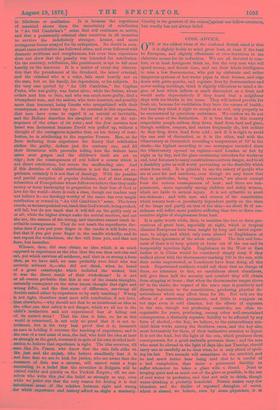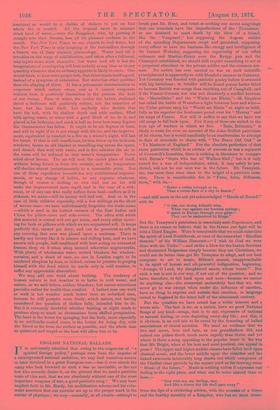COOL ADVICE.
ONE of the oddest ideas of the confused British mind is that it is slightly feeble to mind great heat, at least if the heat be European, and slightly effeminate or over-luxurious to use elaborate means for its reduction. We are all devoted to com- fort, or at least foreigners think so, but the very men who will spend money, and devote time, and use their whole intelligence to raise a low thermometer, who put up elaborate and rather dangerous systems of hot-water pipes in their houses, and edge doors with gutta-percha, and regulate fires by thermometers and never-ending scoldings, think it slightly ridiculous to mind a de- gree of heat which inflicts as much discomfort as a frost, and would smile depreciatively if they heard that a neighbour slept with ice-blocks in his room. They will indeed provide for fresh air, because for vefitilation they have the excuse of health ; but heat they think it right to accept as an evil, only properly to be encountered by querulous endurance. We confess we do not see the sense of the distinction. It is true that in this country respectable people seldom, drop down dead from heat and glare, though soldiers, reapers, and carters frequently do, but neither do they drop down dead from cold ; and if it is right to avoid the one sort of discomfort, so it is the other, and with the Observatory at Greenwich recording a temperature of 92° in the shade—the highest according to one newspaper recorded since the Observatory opened its register—and London as hot by night as by day, and the glare continuing unbroken for weeks on end, heat becomes to many constitutions a serious danger, and to all a disability quite as well worth preventing as the disability which arises from cold. It is pitiable to see the misery of people who are at once fat and xanthou,s, even though we may know that they in particular, being "ready sweaters," are almost exempt from the serious consequences of heat ; and there are tem- peraments, more especially among children and sickly women, which are liable to serious injury. It is not sybaritic to avert sea-sickness ; and with men and women of the constitution which resents heat—a peculiarity dependent partly on the state of the lungs and partly on that of the skin—no short fit of sea- sickness will inflict more positive suffering than two or three con- secutive nights of sleeplessness from heat.
It is quite worth while, then, to mention the two or three pre- ventives of great heat, especially at night, which in tropical climates Europeans have been taught by long and varied experi- ence to adopt, and which only seem absurd to Englishmen at home from ignorance of the whole subject. The first and fore- most of these is to keep quietly at home out of the sun and its temporarily injurious light. Englishmen in the West or East Indies or in China would be considered simply crazy if they walked about with the thermometer marking 100 in the sun, with their necks unprotected, as Londoners have been doing all this week. Experienced residents would tell them that no change of dress, no attention to diet, no carefulness about cleanliness, will give them half the serenity and comfort they will obtain from stopping at home ; that when the thermometer ranges above 80° in the shade, the impact of the sun's rays is positively and directly injurious to the constitution, producing physical de- teriorations which may affect them for life. Not only are the effects of a sunstroke permanent, and liable to reappear on hot days even in cold climates, but the effects of exposure to the sun, though not producing sunstroke, are often re- cognisable for years, producing, among other well-ascertained consequences, a distinctly separate liability to be affected by any form of alcohol,—the key, we believe, to the extraordinary mis- chief drink works among the Southern races, and the key also, most fortunately for them, of their instinctive aversion to liquor. It is not the heat, but the light of the sun, which produces these consequences, for a good umbrella prevents them ;- and the man who must be abroad in the light of days like last Tuesday, should carry one as carefully as he does when be is only afraid of spoil- ing his hat. Two seconds will sometimes do the mischief, and be had much better bear being told that he is careful of a bad complexion, than incur a permanent liability to suffer whenever he takes a glass with a friend. Next to keeping quiet and as much out of the glare as possible, is the use of cool water in profusion, and that not only to drink, though water-drinking is probably beneficial. Nature makes very few blunders, and the dislike of repeated draughts of water, which is shared, we believe, even by some physician's, is 3a irrational as would be a dislike of stokers to put on fuel "there fire is needed. All the tropical races in summer drink hard of water,—even the Bengalees, who, by pouring it straight into their throats, lose all its pleasant coolness in the month. The New Yurk Times, we see, objects to iced water, but the New York Times is only laughing at the teetotallers through a bizarre use of their alarmist phraseology. Water iced till it trembles on the verge of solidification, and taken after a full meal, may injure some weak stomachs ; but water iced till it has the temperature of a cool spring will hurt nobody at any time or in any quantity whatever that an ordinary appetite is likely to crave. One would think, to hear some people talk, that thirst wasin itself a good, instead of a symptom of exhaustion. But water has other qualities than the allaying of thirst. It has a permanent determination to evaporate which nature obeys, and as it cannot evaporate without heat, it positively diminishes in the process the heat of our rooms. Pans of water, the cooler the better, stationed about a bedroom will positively reduce, not the sensation of heat, but the heat itself. Let anybody who doubts that have his tub, with its shallow depth and wide surface, filled with spring-water, or water with a good block of ice in it, and placed in his bedroom, and mark in half an hour how many degrees the thermometer has fallen. It ought to be six degrees at least, and will be eight if he is not stingy with his ice, and the improve- ment, equivalent in comfort to a fire on a winter's night, will last for hours. If that is still insufficient, let him throw up his bedroom windows, fasten an old blanket or travelling-rug across the space, and drench that well with water, and in five minutes the air in -the room will be reduced to that water's temperature. Never mind about breeze. The air will seek the cooler place of itself, without being driven in from the outside, and the temperature will decline almost instantaneously to a reasonable point. Not one of those expedients necessitates any architectural improve- ments, or any change of habits, or any expense whatever, though of course a shilling or two laid out on ice will make the improvement more rapid, and in the case of a sick- room, or of any one who really suffers from heat—suffers as if in sickness, we mean—will be money well laid out. And so in the case of little children especially, will a few shillings on the sheet of woven cane—we have unfortunately forgotten the trade-name —which is used in the hottest corners of the East Indies and China for pillow-cases and sofa-covers. The silica with which this material is coated will not get warm, and every other cover- , ing for beds or pillows with which we are acquainted will. It keeps perfectly dry, cannot get dirty, and can be procured as soft as any covering that ever was placed upon a mattress. There is hardly any luxury like it in intense and stifling heat, and we have known sick people, half-maddened with heat acting on exhausted frames, sleep on it when sleep seemed otherwise unprocurable. With plenty of wholesome water, wetted blankets for window- curtains, and a sheet of cane, no one in London ought to be rendered sleepless by heat, or indeed, unless he persists in gorging himself with the food which he needs only in cold weather, to suffer any appreciable discomfort.
We may add one word about bathing. The tendency of human nature in hot weather is to bathe in cold water, and nature, as we said before, seldom blunders ; but nature sometimes provides rather for health than comfort. A bathed man can work or walk in hot weather much better than an unbathed man, because he will perspire more freely, which nature, not having considered the question of clothes fully, intended him to do. But it is extremely doubtful whether bathing at night tends to produce sleep so much as rheumatism from chilled perspiration. The head is the better for sponging, but the body, more especially in an artificially-cooled room, i8 the better for being dry, with the blood as far from the surface as possible, and the whole man as quiescent and torpid as the heat will allow him to be.































 Previous page
Previous page